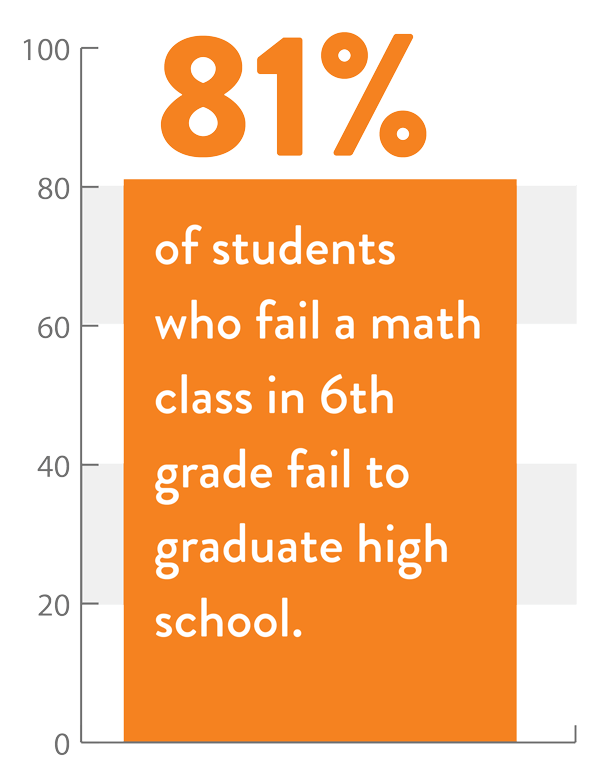Just for Administrators: Why Does Math Matter?

Despite the season, math always finds a permanent spot on your evolving to-do list. As an educational leader, you monitor math performance, allocate intervention resources, and equip your staff to teach from Kindergarten to graduation. You know strong math foundations are critical for students. But just how crucial is math education, and how can you convey its value to stakeholders?
Why is math important?
From the grocery store to the gas pump, students will constantly interact with numbers and calculations. But beyond daily life and future careers, mathematics is proven to have substantial impacts starting at a young age. Let’s add up a few reasons.

- 81% of students who fail a math class in 6th grade fail to graduate high school.
- Early math knowledge is a key predictor for later math success and college and career opportunities.
- Early knowledge of fractions and division predicts high school math achievement.
- Fact fluency speed is a significant predictor of standardized test performance.
- Math achievement alone explains a 30% to 60% variance in the chance of being “on track to college readiness.”
Whether you support a team of teachers, a campus, or an entire district, strong leadership sets the tone for how math is perceived. Here are some specific ways to articulate the importance of math education and strive for growth in instruction.
Why is math important for students?
With all the talk about math, it’s often easy to lose sight of the goal of strong instruction: to prepare students to be the best mathematicians they can be.
Students are behind
The 2022 Nation’s Report Card released by the National Assessment of Educational Progress (NAEP) revealed that 4th- and 8th-grade mathematics scores had the largest decline since initial assessments in 1990. NAEP long-term trend assessment data from the 2022-23 school year revealed the average 13-year-old’s math scores dropped by 9 points, significantly lower than in 2020, with a 14-point drop compared to a decade ago. Educators are not only working to keep students on track but to help them catch up and make substantial learning gains.
Math impacts students’ futures
All students need strong math foundations for productive citizenship and employment. Feeling competent in math can increase student motivation and expand career opportunities. The United States Committee on STEM Education calls early math skills “essential prerequisites to career technical training, advanced college-level and graduate study, and increasing one's technical skills in the workplace.”
Research also shows taking advanced high school math courses (like algebra and geometry) influences future adult earnings.
Math improves thinking and attitudes
Math fact automaticity frees up working memory, allowing students to devote energy to problem-solving and learning new skills.
Math also helps students think critically and develop growth mindsets. Stanford researchers found that elementary students with a “positive attitude toward math performed better in the subject,” revealing attitudes about math from an early age make a difference.

Why is math important for teachers?
“The teacher is the crucial factor in high-quality mathematics teaching and learning.” -National Council of Teachers of Mathematics (NCTM). As an administrator, it’s important to keep teacher development at the top of your radar to best support student learning.
Math knowledge matters
Harvard researchers found that teachers with deeper math knowledge provided “richer learning opportunities” for students. These teachers were able to offer clearer explanations in everyday language, better understand students’ ambiguous comments, provide concrete models of processes, and ask insightful questions.
NCTM stresses the importance of teacher mathematical and pedagogical knowledge and suggests that school leaders “find ways to help teachers develop, maintain, and deepen this knowledge.” Professional development can equip teachers to improve math instruction and teaching skills, whether they’ve been in the classroom for ten minutes or ten years.
Teacher attitudes make a difference
A Stanford study found that teachers who approached mathematics teaching with a growth mindset, believing all students could succeed at math, resulted in “dramatically improved” student test scores and mindsets about math. Strong math teachers help students connect math to everyday life and develop critical thinking skills rather than rote memorization.
Class time and resources count
NCTM notes that “ample instructional time is essential for mathematics learning.” They recommend school leaders allocate proper time for math instruction and find ways to make more time for math, including before and after-school interventions and increased teacher planning time for greater collaboration.
With rising staff changes, it’s even more essential to support educators with research-based, easy-to-implement math tools. Regardless of the teacher or substitute in the room, you can ensure students are getting access to high-quality mathematics.
Why is math important for my school or district?
While each state, district, and community is different, math academic achievement measurements have an impact.
Funding and rankings
Test performance and graduation rates often impact school rankings and access to funding. For example, multiple factors influence Texas school accountability rankings, including standardized test scores (including math), graduation-related milestones, school progress, and reduction in achievement gaps. In New York, performance on math state tests impacts overall school quality snapshots and student achievement ratings.
Math’s impact can’t be erased
Your leadership efforts can influence math mindsets and profoundly impact learning. Instilling a culture where educators and families support, celebrate, and encourage math will have lasting effects on the staff and students you serve.
Looking for math solutions?
ExploreLearning math solutions are research-based, engaging tools for grades 3-12.
LEARN MORESign up to get the latest updates from ExploreLearning via occasional email.